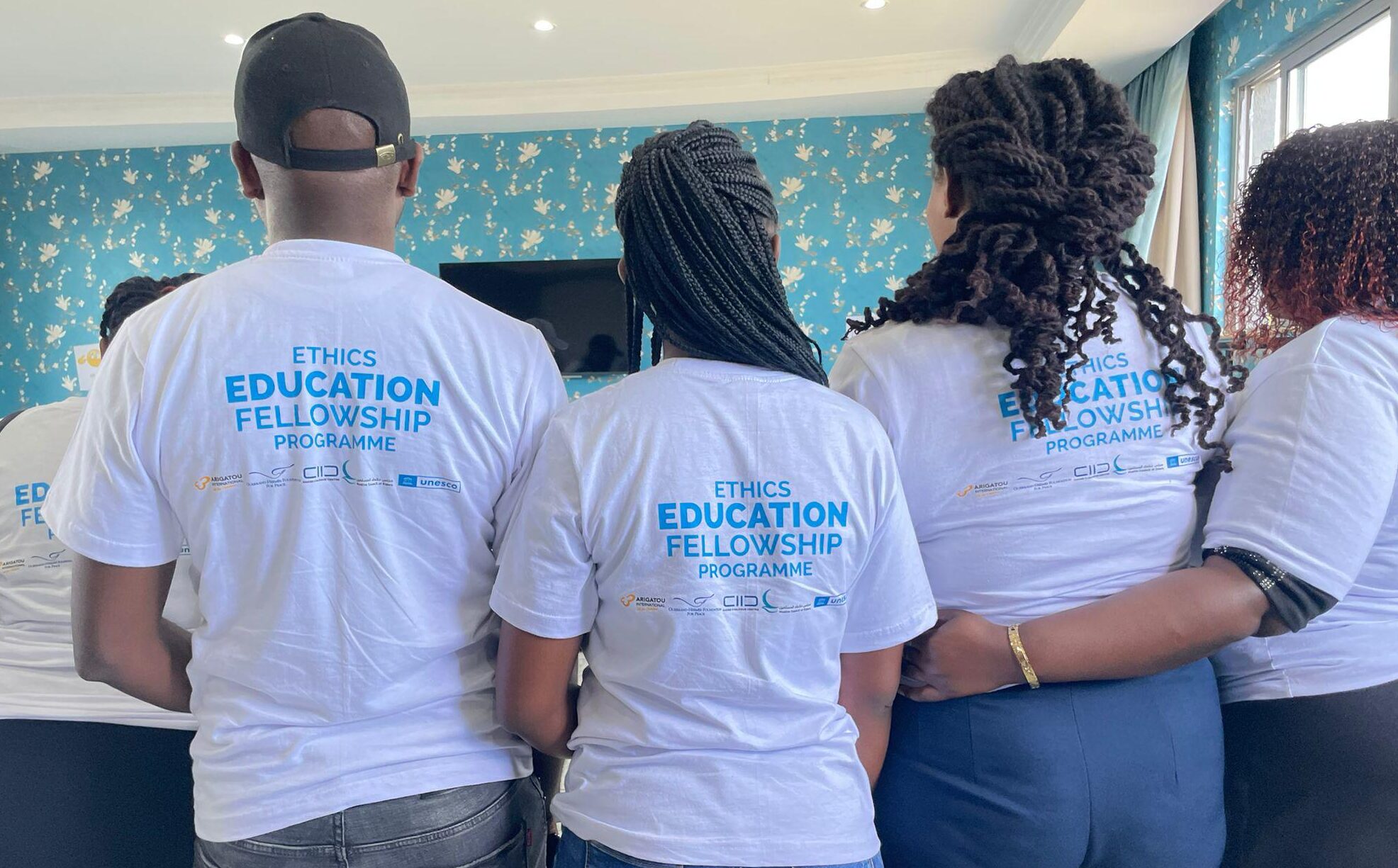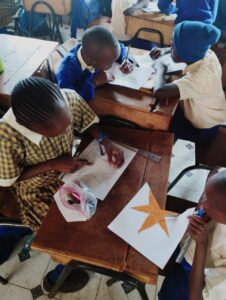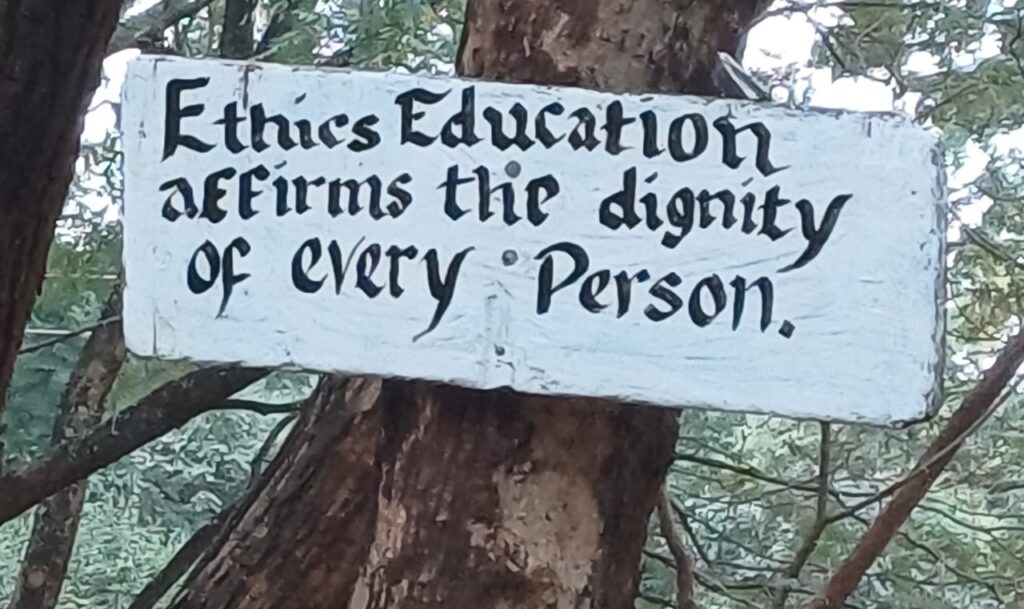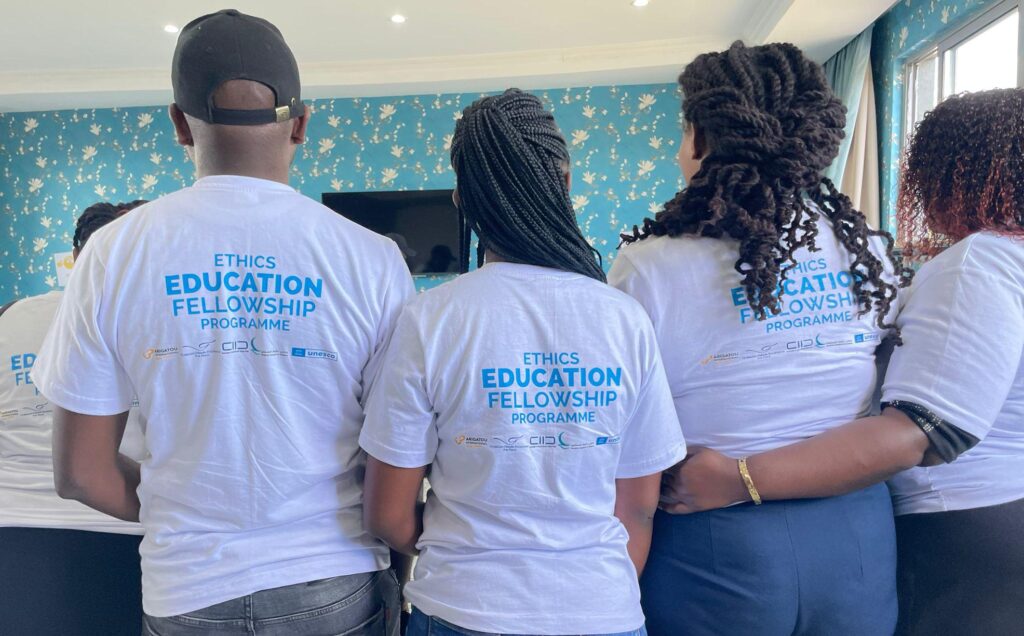
The Ethics Education Fellowship successfully concluded its implementation phase in Kenya, benefiting 1,200 children across six schools. As a result, the implementation with children not only revealed the positive impact of ethics education on the students, but also reinforced its pivotal role as a cornerstone for cultivating just, inclusive, sustainable, and peaceful communities.
Kenya faces a set of unique challenges when it comes to the quality of education, especially within rural and marginalized communities where poverty, inadequate infrastructure, lack of resources for teacher training, and gender and cultural barriers persist. Additionally, the communities have been facing a rise in inter-ethnic conflicts and seclusion, propelling social tensions at the community level.
Against this backdrop, the Ethics Education Fellowship program greatly contributed to the holistic development of children, expanding their competencies in critical thinking and decision-making, interfaith and intercultural awareness, community engagement and social responsibility. Furthermore, it facilitated processes to enhance parents’ participation in children’s education, developing closer connections between teachers, parents and learners, and building better relationships across the learning communities. This local implementation has been carried out as a collaborative effort between multiple stakeholders, including the Ministry of Education, the Kenya Institute for Curriculum Development, the Kenya National Commission for UNESCO, the Thogoto Teacher Training College and the Kenyatta University.
National Teacher Training Workshop
The Ethics Education Fellowship was launched in Kenya in 2023 with a national Teacher Training Workshop. The workshop gathered 32 participants including teachers and representatives from different partner organizations. The workshop was inaugurated with opening remarks shared by Ms. Florence Amoit, representing the Ministry of Education.
During the workshop, the participants underwent a transformative learning journey that exposed them to new teaching approaches to integrate interfaith and intercultural learning and dialogue, global citizenship, inclusivity and peace in the classrooms and beyond.

The workshop kept the participants at the center of the learning process while building a safe platform for dialogue. Urging the learners to discuss and reflect on difficult topics on social conflicts allowed them to stretch their comfort zones in a challenging yet beneficial manner. “Now we are able to build one another and live harmoniously to achieve our visions and our goals. Ethics Education did that for me,” stated a participant reflecting on their learning journey.
A key focus of the workshop was exploring how ethics education can strengthen Kenya’s existing value-based education approach. It was noted that ethics education and its transformative pedagogy can contribute greatly to addressing contemporary and pertinent issues in the local communities when integrated into the national framework. By the end of the workshop, the participants had developed competencies in navigating complex ethical dilemmas, identifying stakeholders and considering multiple perspectives. Additionally, they advanced their skills in articulating ethical concepts, fostering dialogue and facilitating sensitive discussions with a practical sense of designing, implementing and assessing ethics education initiatives.
Implementation with Children

Kenya began their implementation of ethics education with children in May 2023. The schools and the learners engaged were selected through an inclusive process to involve diverse communities from different social and ethnic backgrounds. The students were introduced to the concepts of ethics education through a variety of activities including visits to places of worship, interfaith dialogues, cultural celebration events, community workshops, class meet-ups for cultural sharing, etc.
Following these activities, the learners took the initiative to form their own “Ethics Clubs” and came up with their own activities to promote social cohesion and relationship-building among different communities. “Involving learners in community affairs prepares them for the future and they are in a better position to solve problems critically and live in harmony,” shared one of the teachers.
The children’s initiatives influenced the integration of ethics education into school assemblies, cultural activities and open days. These initiatives also helped mainstream ethics education in the school subjects, classroom activities and how the overall teaching and learning process was conducted, shaping it to become more participatory and transformative.
A Monitoring, Evaluation and Learning process was carried out throughout the implementation, revealing positive changes in the participating students and their communities. These include improved discipline at school and at home, better academic performance and environmental awareness, increased capacities in peaceful conflict resolution, and better knowledge retention among the learners. Further, it has been noted that the learners became more outspoken and proactive, showed better social-emotional capacities, fostered healthy relationships and held solidarity, care, and concern over others in their community.

“I would also stand up for someone whose dignity has been violated (…) This means we should not mistreat others no matter how they look, we should be kindhearted and consider everyone in trouble in rough times,” shared one of the students.
After this positive experience, the Ministry of Education of Kenya started discussions to make ethics education a compulsory training component in their in-service teacher training programs. Also, the Kenya Institute of Curriculum Development, in collaboration with the fellows and trained teachers, developed a set of resources on Values-based Teachers and Leaders, highlighting the intersections between ethics education and values-based education for classrooms. Furthermore, the program helped connect teachers, decision-makers, community stakeholders as well as learners, thereby enhancing learning networks and bolstering support for ethics education practitioners.
The Ethics Education Fellowship

The Ethics Education Fellowship is a joint effort carried out collaboratively in Bangladesh, Indonesia, Kenya, Mauritius, Nepal and Seychelles. Initiated in 2022, the Fellowship program seeks to enhance the sustainable provision of ethics education programs for children within formal educational environments. The initiative aims to nurture ethical reflections among children, advance global citizenship, and support the development of a more harmonious and inclusive society.
This unique program was conceptualized and designed through the partnership between Arigatou International, the Guerrand-Hermès Foundation for Peace, the KAICIID International Dialogue Centre, the Muslim Council of Elders, the UNESCO Regional Office for Eastern Africa, and the UNESCO New Delhi Cluster Office, in collaboration with the National Commissions for UNESCO of the six participating countries, and implemented under the support of their corresponding Ministries of Education and UNESCO National Commissions.
To this date, the program has managed to effectively build capacities in 323 educators across the participating countries, equipping them with the skills to incorporate ethics education into their teaching methodologies. This effort has resulted in reaching 7,334 children, showcasing commendable outcomes in their cognitive, behavioral, and socio-emotional domains. Built on a strong foundation of transformative pedagogical understanding, the fellowship fosters a unique participatory and learner-centric approach to social change through the integration of ethics education in local educational structures and communities.
The Kenyan partners in the implementation process believe that with further advocacy and support from various partners including the government, they will be able to carry forward these interventions to a national scale. In this essence, we would like to share our gratitude with the local partnering institutions in Kenya, teachers who have been rolling out these programs with children and the fellows of the Ethics Education Fellowship program representing Kenya; Ms. Catherine Ondieki, Ms. Dorah Mkabili Kitala, Ms. Jane Wanjiru Nyaga, Ms. Margaret Wairimu Chege and Ms. Olivia Achieng Opere for their invaluable support and commitment, which has been indispensable in this success. We would also like to especially mention the valuable contribution made by the Kenya National Commission for UNESCO represented by Ms. Mary Kangethe for the support throughout the planning and implementation of the program.
